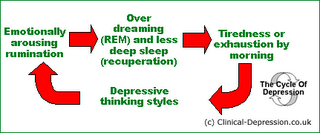Treat depression

“Regarding depression as 'just' a chemical imbalance wildly misconstrues the disorder. It is not possible to explain either the disease or its treatment based solely on levels of neurotransmitters,” says Yale University neurobiologist Ronald Duman, Ph.D.
It is important for you to be well informed about medications for depression if you are taking any of these medications, but this is not a “do-it-yourself” column. Self-medication can be dangerous. Interpretation of both the signs and symptoms of depression, and identification of possible side effects, are jobs for the professional.
Just as paracetamol can bring down a fever with-out clearing up the infection that causes it, psychotherapeutic medications act by controlling symptoms. Like most drugs used in medicine, they correct or compensate for some malfunction in the body.
Psychotherapeutic medications do not cure depression. In many cases, these medications can help a person get on with life despite some continuing mental pain and difficulty coping with problems.
For example, antidepressants can lift the dark, heavy moods of depression. The degree of response ranging from little relief of symptoms to complete remission depends on a variety of factors related to the individual and the particular disorder being treated.
As to how long a person must take a psychotherapeutic medication depends on the disorder. Many depressed and anxious people may need medication for a single period, perhaps for several months, and then never have to take it again. For some cases of depression, medication may have to be taken indefinitely or, perhaps, from time to time.
Antidepressant drugs are effective in the treatment of major depression of moderate and severe degree including major depression associated with physical illness and that following childbirth; they are also effective for dysthymia (lower grade chronic depression). Antidepressants were first used in the late 1950s. Now they are divided into three main classes:
- Tricyclic drugs (TCAs)
TCAs and related antidepressants can be roughly divided into those with additional sedative properties and those that are less so. Agitated and anxious patients tend to respond best to the sedative compounds whereas withdrawn and apathetic patients will often obtain most benefit from the less sedating ones.
Those with sedative properties include amitriptyline, clomipramine, dosulepin (dothiepin), doxepin, maprotiline, mianserin, trazodone, and trimipramine.
Those with less sedative properties include amoxapine, imipramine, lofepramine, and nortriptyline. - Monoamine oxidase inhibitors (MAOIs)
MAOIs are used for all types of depression. They have also been used when “atypical” features are present with the depression such as excessive sleeping, overeating and anxiety. Some examples are phenelzine, isocarboxazid and tranylcypromine. Phobic patients and depressed patients with atypical, hypochon-driacal, or hysterical features are said to respond best to MAOIs. - Selective serotonin
reuptake inhibitors (SSRIs)
These were developed in the 1980s and are the most commonly prescribed today. Citalopram, escitalopram, fluoxetine, fluvoxamine, paroxetine, and sertraline selectively inhibit the re-uptake of serotonin (5-hydrox-ytryptamine, 5-HT); they are termed selective serotonin re-uptake inhibitors (SSRIs). Serotonin and Norepinephrine Reuptake
Inhibitors (SNRIs) are newer “reuptake inhibitors” that work on blocking the reuptake of different neurotransmitters (brain chemicals). An example would be Venlafaxine. In general SNRIs cause fewer side-effects than TCAs and MAOIs.
Another type is bupropion, which is a dopamine reuptake blocking compound. It acts on the neurotransmitters dopamine and norepinephrine.
How effective is depression medication?
Many people find great relief by using antidepressants. They can be effective in giving a quick response, to relieve suffering in severe cases of depression. But the long-term use of antidepressants is far from the being the answer to depression. Also, as we have seen, if you are depressed, you need to learn the skills necessary to avoid depression in the future, not just treat the symptoms with drugs.
Labels: depression


1 Comments:
The human brain is the most complex organ in the body.
Depression is the most baffling of all diseases. It is a biological disease just like cancer.
Thanks for your informative post. It will help many depression sufferers.
There is a new FDA approved, non-pharmaceutical based treatment for severe or chronic depression. It is called vagus nerve stimulation therapy- a 90 minute out patient procedure.
It completely changed my life. I am so grateful.
Charles E. Donovan
MyDepressionSpace.com
Post a Comment
Links to this post:
Create a Link
<< Home